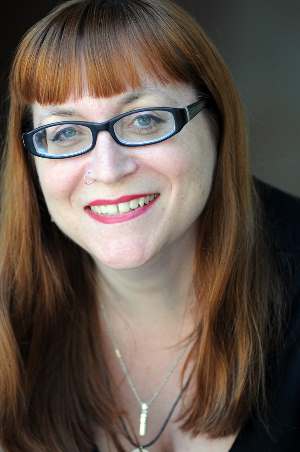BERKELEY, CALIF.: Impact Theatre, the 20-year-old new-play presenter, announced on Jan. 4 that it will close its doors in June, following the end of its current season. For artistic director Melissa Hillman, who cofounded the company in 1996, the news has arrived with a certain degree of melancholy.
“I’m sort of evaluating my life,” she told American Theatre over the phone. “Twenty years of my life! I had Impact before I had my actual physical baby. Impact was my baby.”
Impact currently operates out of the basement of a pizza parlor on the University of California–Berkeley campus, which it will vacate in June. The season’s final production will be Plan 9 from Outer Space by Sarah Coykendall and Michael Delaney, based on the cult film.
The closure has been a long time coming, as the theatre has struggled for years to find the necessary grants and donations to stay open. Impact’s annual budget was $60,000 on average—which sounds small, but it has its own disadvantages, as Hillman explained: Most small-theatre grants require organizations to have a budget of at least $100,000.

And unlike many theatres, Hillman wanted hers to stay small. Being small was a strength, she felt, because what Impact lacked in size it made up for in its nimbleness, its ability to take risks on unknown artists, provide second productions to playwrights, and program unconventional new plays, including the Dungeons & Dragons riff Of Dice and Men by Cameron McNary; Bekah Brunstetter’s The Oregon Trail, inspired by the cult favorite computer game; or this season’s The Gun Show by E.M. Lewis, about gun control. Impact also helped to launch the careers of a variety of artists, such as playwrights Lauren Gunderson, Lauren Yee, and Reggie White, and director Desdemona Chiang. It also introduced the Bay Area to the works of Steve Yockey, Roberto Aguirre-Sacasa, and Sheila Callaghan, among many others. Once a season, Impact also produced a reimagined Shakespeare play or a similar classic, such as a lesbian Othello or a Troilus and Cressida set during the war in Afghanistan.
“We wanted something that was more diverse than what we were seeing,” explained Hillman, comparing Impact’s programming to that of the LORT-sized theatres in the Bay Area. “And we wanted something that was more honest than what we were seeing.” Impact didn’t just produce art for art’s sake, she said; they produced art geared specifically for an under-40 audience, with ticket prices ($10-$25) to match that mission.
“We wanted to bring in that younger audience,” says Hillman. “That younger audience came, but they just don’t have money; they’re not giant donors. Grants usually are what you use to fill the gaps.” But, as she noted, granting organizations “did not want to fund really small theatres that wanted to stay small,” and they didn’t want to fund second productions (as opposed to world premieres).
For Hillman and her staff, Impact was a labor of love. She and managing director Cheshire Isaacs never paid themselves a salary for running (Hillman works as a high school English and drama teacher at a private school), but they were able to pay every artist who worked on one of their shows a $500 stipend.
But the closure does not mean the absolute end for Impact. Though the details haven’t been solidified, Hillman and Isaacs plan to continue lending a hand to up-and-coming Bay Area talent via “Impact 2.0.” Over the phone, Hillman mused about creating a website for talented Bay Area stage managers, designers, directors, and actors, or creating a theatre reviewing website or publication.
“A billion years ago, [theatre critic] Robert Hurwitt called us the research and development wing of the Bay Area theatre,” said Hillman. “There’s a way to continue to help people—with their careers, with the next step—that’s not producing. It’s still Impact Theatre, it’s still the launchpad. It’s just in a different formation.”
The new iteration of Impact might be able to coproduce with other theatres or self-produce one show a year, she speculated. “I can see us partnering with a writer to create a new script, something that they want developed by people they know who love their work,” Hillman said. “We may come into another theatre.”
Whatever the future holds, Hillman is adamant that Impact’s mission—fostering new talent and allowing underrepresented voices to be seen onstage—will live on. She recalls an audience member’s reaction to Impact’s 2005 production of Othello, which cast the title character as a black lesbian in love with a white Desdemona.
“At previews, this young black lesbian came up to me with tears in her eyes, saying, ‘I never thought there would be a place for me at Shakespeare’s table. I never thought I would see my story onstage,'” Hillman remembered. “And I thought, Whoa! Put that on my tombstone; I’m done. I’ve done everything I’ve come to Earth to do. You never think that what you’re doing is important to others.”
Now that’s impact.


